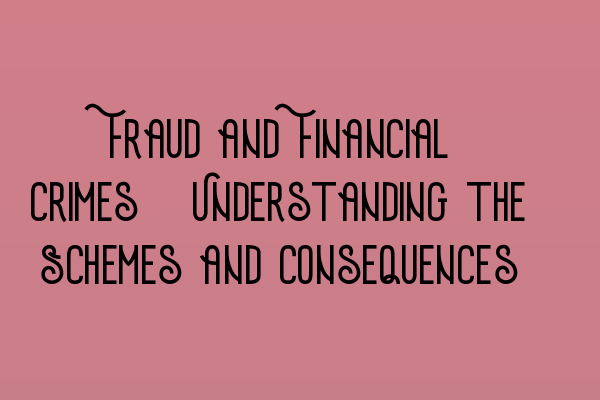Fraud and Financial Crimes: Understanding the Schemes and Consequences
Welcome to SQE Criminal Law & Practice Law UK! In today’s blog post, we will be discussing the intricate world of fraud and financial crimes. These offenses encompass a wide range of unlawful activities that involve deception, dishonesty, and the abuse of trust for personal or financial gain. Understanding the schemes and consequences of these crimes is crucial for legal professionals, law students, and anyone seeking to protect themselves from becoming victims.
Types of Fraud and Financial Crimes
1. Identity Theft: Identity theft occurs when someone steals another individual’s personal information, such as their name, social security number, or credit card details, and uses it for fraudulent purposes. This crime can have devastating consequences for the victim, including financial loss and damage to their reputation.
2. Ponzi Schemes: Ponzi schemes are fraudulent investment operations that promise high returns to investors but use funds from new investors to pay previous investors. This creates a false appearance of profitability until the scheme collapses, leaving many victims with significant financial losses.
3. Money Laundering: Money laundering involves disguising the origins of illegally obtained money to make it appear legitimate. Criminal organizations often engage in money laundering to integrate illegal funds into the legitimate economy, making it difficult to trace the proceeds back to their illicit activities.
4. Insider Trading: Insider trading refers to the buying or selling of stocks or other financial securities based on confidential information not yet available to the general public. This practice is illegal as it undermines the fairness and integrity of financial markets.
Consequences of Fraud and Financial Crimes
The consequences of fraud and financial crimes can be severe, both for individuals and society as a whole. These crimes erode public trust in financial institutions, undermine the economy, and can lead to substantial financial losses for victims.
Legal consequences may include imprisonment, fines, probation, and restitution. The severity of these penalties depends on various factors, such as the nature and extent of the fraud, the amount of money involved, and the defendant’s criminal history. Additionally, individuals convicted of fraud and financial crimes often face long-lasting reputational damage and difficulties in securing future employment or financial opportunities.
At SQE Criminal Law & Practice Law UK, we provide comprehensive training on the laws, regulations, and legal practices surrounding fraud and financial crimes. Our SQE Sample Papers: Practice for Exam Success guide will help law students prepare for their upcoming exams by providing practice questions and detailed explanations. Mastering key concepts is essential for success in both SQE1 and SQE2, and our Focus Areas in SQE1 and SQE2: Mastering Key Concepts article offers valuable insights and study tips.
Furthermore, we understand the importance of adjusting your SQE strategy based on your mock performance. Our article on Adjusting Your SQE Strategy Based on Mock Performance delves into effective strategies to improve your performance and maximize your chances of success. SQE Mock Debrief Sessions: Critical Steps for Improvement outlines the critical steps you should take during mock debrief sessions to identify areas for improvement and develop targeted study plans.
In conclusion, fraud and financial crimes pose significant threats to individuals, organizations, and the economy at large. Understanding the schemes and consequences associated with these illicit activities is crucial for legal professionals and individuals to protect themselves and combat the perpetrators. By staying informed and continuously improving your knowledge and skills, you can play an active role in preventing and prosecuting these crimes.
We hope you found this blog post informative and valuable. For more insightful articles and resources, be sure to check out our website and stay tuned for future updates!
